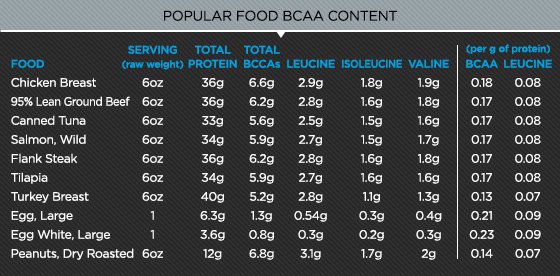I like BCAA supplements, but I know that essential aminos are also found in many foods. What are the best dietary sources of BCAAs?
Branched-chain amino acid supplements are extremely popular for boosting protein synthesis during and after training sessions, in addition to providing a convenient between-meal spike in the muscle-building amino leucine. However, with the explosion in popularity of BCAA supplementation, the role of whole food sources of BCAAs is often overlooked.
Chewing and swallowing your aminos will never be as easy as simply mixing a powder in water. On the other hand, man cannot and should not live on supplements alone. If you're looking to up your diet's anabolic and recovery-aiding potential, check out this breakdown of the BCAA content in some popular protein sources:

This table reveals some interesting information about the BCAA content of popular foods. For example, turkey breast provides more total protein than any of the other proteins per ounce—not including eggs and egg whites, which aren't usually measured in ounces—but the smallest amount of total BCAAs. By comparison, a 6 oz serving of dry-roasted peanuts packs more leucine and total BCAAs than any of the meat sources, but not nearly as much protein.
To minimize confusion and level the playing field a bit, I included the right two columns, which allow for better comparisons from one protein source to the next. Note that per gram of protein, eggs and egg whites provide the highest levels of BCAAs. Eggs again are also marginally superior when it comes to leucine content. This should be of interest to you because leucine is the main driver of muscle protein synthesis. That said, the amount of leucine is very similar per gram of total protein in all of the foods.
Which Should I Choose? ///
Any of the foods listed above are good sources of BCAAs. Research shows that 3 grams is the approximate amount of leucine needed at a given meal to maximize muscle protein synthesis, so 6 oz of any of these meats is on the low side of what you would want to consume at a meal.

If you can stomach them, six whole eggs or nine egg whites would allow you to hit the 3 gram leucine target. On the other hand, 6 oz of peanuts may not sound like a lot, but a handful is approximately 1 oz, give or take, so 6 oz is definitely a hefty portion.
The next step for you is to look at your meal plans, calorie intake, and macro breakdowns to see if you are consuming enough of these foods per meal in order to get 3 grams of leucine per meal. If not, and you can't increase your servings of these protein foods due to calorie or macro restrictions, then consider upping your intake through BCAA supplementation.

No comments:
Post a Comment